|
Featured picture tools: |
These featured pictures, as scheduled below, appeared as the picture of the day (POTD) on the English Wikipedia's Main Page in October 2016. Individual sections for each day on this page can be linked to with the day number as the anchor name (e.g. [[Wikipedia:Picture of the day/October 2016#1]] for October 1).
You can add an automatically updating POTD template to your user page using {{Pic of the day}} (version with blurb) or {{POTD}} (version without blurb). For instructions on how to make custom POTD layouts, see Wikipedia:Picture of the day.Purge server cache
October 1

|
The islet of Ko Tapu stands in front of Khao Phing Kan, an island in Phang Nga Bay, northeast of Phuket in Thailand. The islands are limestone tower karsts and part of Ao Phang Nga National Park. Since 1974, when they were featured in the James Bond movie The Man with the Golden Gun, the islands have been popularly called James Bond Island. Photograph: Diego Delso
Recently featured:
|
October 2

|
City of Workers is an oil painting on canvas completed by the Berlin Secessionist painter Hans Baluschek in 1920. It depicts a dark and dirty working class sector of the German capital, Berlin, in which industrial smoke dominates the skyline and the few lights of windows are drowned in the gloom. The 48.44 × 36.25 in (123 × 92.1 cm) work is held at the Milwaukee Art Museum. Painting: Hans Baluschek
Recently featured:
|
October 3

|
A 1 rupiah banknote from the first issue of banknotes by newly formed Indonesia. Although dated 17 October 1945, the notes were not actually issued until late 1946. The legal tender obligation is arched across the front of the note, Tanda pembajaran jang sah ("A valid/legal indication of payment"). The banknote is unevenly cut, and the top and bottom of the design are not completely parallel. Banknote: Government of Indonesia; image courtesy of the National Numismatic Collection
Recently featured:
|
October 4

|
Michael Mullen (b. 1946) is a retired United States Navy admiral who served as the 17th Chairman of the Joint Chiefs of Staff from October 1, 2007, to September 30, 2011, having previously served as the Navy's 28th Chief of Naval Operations. He was only the third officer in the Navy's history to be appointed to four different four-star assignments. Mullen retired from the Navy after over 43 years of service, later serving as a visiting professor at Princeton University. Photograph: United States Department of Defense
Recently featured:
|
October 5

|
The cloister at Worcester Cathedral, an Anglican cathedral situated on a bank overlooking the River Severn in Worcester, England. The seat of the Bishop of Worcester, it was built between 1084 and 1504 and represents every style of English architecture from Norman to Perpendicular Gothic. The cathedral is known for its Norman crypt, unique chapter house, unusual Transitional Gothic bays, and its woodwork. Photograph: David Iliff
Recently featured:
|
October 6

|
The Mercator projection is a cylindrical map projection presented by the Flemish geographer and cartographer Gerardus Mercator in 1569. Because it represents paths of constant course as straight lines, it long served as the standard map projection for nautical purposes. However, it distorts the size of objects as the latitude increases: thus areas in the mid-latitudes appear significantly larger than their actual size relative to those the equator, and those near the poles are even more exaggerated. Most modern atlases no longer use the Mercator projection for world maps or for areas distant from the equator, preferring other cylindrical projections, or forms of equal-area projection. Map: Strebe, using Geocart
Recently featured:
|
October 7

|
The Indian yellow-nosed albatross (Thalassarche carteri) is a member of the albatross family, and the smallest of the mollymawks. This colonial breeder feeds on fish, crustaceans and cephalopods. In 2004, BirdLife International split this species from the Atlantic yellow-nosed albatross, though this distinction is not universally recognized. Photograph: JJ Harrison
Recently featured:
|
October 8

|
John Hay (1838–1905) was an American statesman and official, whose career in government stretched over almost half a century. Beginning as a private secretary and assistant to Abraham Lincoln, Hay's highest office was United States Secretary of State under Presidents William McKinley and Theodore Roosevelt. Hay was also an author and biographer, and wrote poetry and other literature through much of his life. Photograph: C. M. Gilbert; restoration: Adam Cuerden
Recently featured:
|
October 9

|
A Tibetan manjuvajramandala with 43 deities, measuring 71 by 85 centimetres (28 in × 33 in) and held at the Museo d'Arte Orientale. Such mandalas are spiritual and ritual symbols in Indian religions, representing the universe. Most mandalas consist of a square with four gates containing a circle with a center point and exhibit radial balance. Each gate is generally shaped like a T. Mandalas may be employed for focusing attention of practitioners and adepts, as a spiritual guidance tool, for establishing a sacred space, and as an aid to meditation and trance induction. Thangka: Unknown
Recently featured:
|
October 10

|
Odissi is an ancient classical dance that originated in the Hindu temples of Odisha, India. Historically, it has been performed predominantly by women, and expressed religious stories and spiritual ideas, particularly of Vaishnavism (Vishnu as Jagannath), but also of other traditions such as those related to Hindu gods Shiva and Surya, as well as Hindu goddesses (Shaktism). Modern Odissi productions by Indian artists have presented a diverse range of experimental ideas, culture fusion, themes and plays. Odissi is learnt and performed as a composite of a basic dance motif called the Bhangas (symmetric body bends, stance). It involves the lower, mid, and upper body as three sources of perfecting expression and audience engagement with geometric symmetry and rhythmic musical resonance. Photograph: Augustus Binu
Recently featured:
|
October 11

|
A deluxe airline meal by Do & Co as served aboard Austrian Airlines flights. This meal consists of boquerones, olive tapenade, tomatoes and basil in olive oil, jamon, manchego, fuet, chorizo, grilled vegetables, chocolate mousse, strawberries, and a bread basket. Such airline meals are served to passengers on board commercial airliners and prepared by specialist airline catering services. Airline meals vary widely in quality and quantity across different airline companies and classes of travel, and may range from a simple snack or beverage in short-haul economy class to a seven-course gourmet meal in a first class long-haul flight. Photograph: Austrian Airlines |
October 12

|
The Helix Nebula is a large planetary nebula located in the constellation Aquarius. Discovered by Karl Ludwig Harding, probably before 1824, it is one of the closest to Earth of all the bright planetary nebulae, about 215 parsecs (700 light-years) away. It is similar in appearance to the Cat's Eye Nebula and the Ring Nebula. Photograph: NASA/JPL-Caltech/University of Arizona
Recently featured:
|
October 13

|
The Peasant Wedding is a 1567 genre painting by the Flemish Renaissance painter and printmaker Pieter Bruegel the Elder, one of many depicting peasant life. It is housed in the Kunsthistorisches Museum, Vienna. Painting: Pieter Bruegel the Elder
Recently featured:
|
October 14

|
C. Everett Koop (1916–2013) was an American pediatric surgeon and public health administrator. He was a vice admiral in the Public Health Service Commissioned Corps, and served as the 13th Surgeon General of the United States under President Ronald Reagan from 1982 to 1989. Koop was known for his work to reduce tobacco use, AIDS, and abortion, and for his support of the rights of disabled children. Photograph: United States Public Health Service; restoration: Adam Cuerden
Recently featured:
|
October 15

|
|
A panoramic interior view of the Chehel Sotoun, a pavilion in Isfahan, Iran, which was built by Shah Abbas II to be used for his entertainment and receptions. The pavilion contains many frescoes and paintings on ceramic. Photograph: Muhammad Mahdi Karim
Recently featured:
|
October 16

|
Still Life – Apples and Jar, a still life by the Scottish Post-Impressionist Samuel Peploe completed c. 1912–1916 and now held at the Art Gallery of New South Wales. Peploe (1871–1935) was one of the group of four painters that became known as the Scottish Colourists; the other colourists were John Duncan Fergusson, Francis Cadell and Leslie Hunter. Painting: Samuel Peploe
Recently featured:
|
October 17
|
A video from the trial mode for Fez, an indie puzzle-platform video game developed by Polytron Corporation and published by Trapdoor in 2012. In this game, the player-character Gomez receives a fez that reveals his two-dimensional world to be one of four sides of a three-dimensional world. The player must rotate between these four 2D views to realign platforms and solve the game's puzzles. Video: Polytron Corporation
Recently featured:
|
October 18

|
The Fog Warning is an oil painting on canvas completed in 1885 by the American painter Winslow Homer (1836–1910). It depicts a lone fisherman in a dory who has caught several halibut, but must return to his ship despite a fog blowing up and threatening to cut him off. This painting is now held at the Museum of Fine Arts in Boston. Painting: Winslow Homer
Recently featured:
|
October 19

|
The Miller cylindrical projection is a modified Mercator projection proposed by Osborn Maitland Miller (1897–1979) in 1942. The latitude is scaled by a factor of 4⁄5, projected according to Mercator, and then the result is multiplied by 5⁄4 to retain scale along the equator. Map: Strebe, using Geocart
Recently featured:
|
October 20

|
Tripedalia cystophora is a small species of box jellyfish in the family Tripedaliidae. It is native to the Caribbean Sea and the Central Indo-Pacific, where it is found in the margins of mangrove lagoons. Photograph: Jan Bielecki, Alexander K. Zaharoff, Nicole Y. Leung, Anders Garm, Todd H. Oakley; edit: Ruthven
Recently featured:
|
October 21

|
A posthumous portrait of Herman Willem Daendels (1762–1818), a Dutch politician. He was the 36th Governor-General of the Dutch East Indies, between 1808 and 1811, and was responsible for several infrastructure developments, including the Great Post Road. When the Netherlands was incorporated into France in 1810, Daendels returned to his homeland and became a major general in Napoleon's army. Daendels was later sent to govern the Dutch Gold Coast, dying there of malaria. Portrait: Raden Saleh
Recently featured:
|
October 22
|
A panorama of the Alhambra as seen from Mirador de San Nicolás. From left to right: Generalife, Pico del Veleta, Palacios Nazaríes, Palace of Charles V, and Alcazaba. The Alhambra is a palace and fortress complex located in Granada, Andalusia, Spain. Originally constructed as a small fortress in AD 889, it was largely ignored until the ruins were renovated and rebuilt in the mid-13th century by the Moorish emir Mohammed ben Al-Ahmar. Over the years it has served as the royal palace of Yusuf I of Granada and the royal court of Isabella I of Castile. The Alhambra is now one of Spain's major tourist attractions, exhibiting the country's most significant and well-known Islamic architecture, together with 16th-century and later Christian building and garden interventions. Photograph: Kim Hansen
Recently featured:
|
October 23
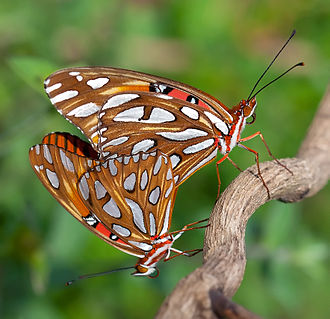
|
A pair of gulf fritillaries (Agraulis vanillae) mating. The gulf fritillary is a bright orange butterfly of the family Nymphalidae and subfamily Heliconiinae, found along their migration route, ranging from Argentina in the south to upper California in the north. Photograph: MrX; edits: Gwillhickers, Crisco 1492
Recently featured:
|
October 24

|
Dendrogramma is a monotypic genus of siphonophore identified in 2014 from a collection of specimens gathered in 1986. Although specimens were at first identified as two species, D. enigmatica and D. discoides, these were later shown to represent varieties of a single species. When Dendrogramma was first discovered, it was speculated that the genus could not be classified into any existing phylum. However, examination of RNA material identified it as a siphonophore in 2016. The specimens are presumed to represent parts (bracts) of a larger organism whose entire morphology is unknown. This diagram, depicting the holotype, was included in the article which first described Dendrogramma. Photograph: Jean Just, Reinhardt Møbjerg Kristensen, and Jørgen Olesen
Recently featured:
|
October 25
Subpage 1
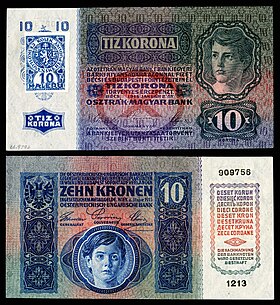
|
A 10-korun banknote from the first issue of the Czechoslovak koruna, the national currency of Czechoslovakia from 1919 to 1939 and from 1945 to 1993. The issue, which consisted of denominations of 10, 20, 50, 100 and 1000 korun, used banknotes of the Austro-Hungarian Bank to which adhesive stamps equal to 1/100 the value of the note were affixed. See another banknote: 20 korun, 50 korun, 100 korun, 1,000 korun Banknote: Austro-Hungarian Bank and the First Republic of Czechoslovakia; image courtesy of the National Numismatic Collection
Recently featured:
|
Subpage 2
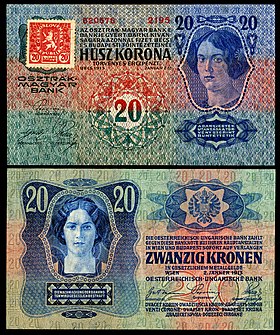
|
A 20-korun banknote from the first issue of the Czechoslovak koruna, the national currency of Czechoslovakia from 1919 to 1939 and from 1945 to 1993. The issue, which consisted of denominations of 10, 20, 50, 100 and 1000 korun, used banknotes of the Austro-Hungarian Bank to which adhesive stamps equal to 1/100 the value of the note were affixed. See another banknote: 10 korun, 50 korun, 100 korun, 1,000 korun Banknote: Austro-Hungarian Bank and the First Republic of Czechoslovakia; image courtesy of the National Numismatic Collection
Recently featured:
|
Subpage 3
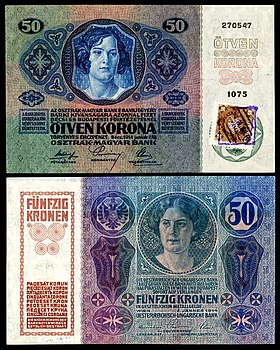
|
A 50-korun banknote from the first issue of the Czechoslovak koruna, the national currency of Czechoslovakia from 1919 to 1939 and from 1945 to 1993. The issue, which consisted of denominations of 10, 20, 50, 100 and 1000 korun, used banknotes of the Austro-Hungarian Bank to which adhesive stamps equal to 1/100 the value of the note were affixed. See another banknote: 10 korun, 20 korun, 100 korun, 1,000 korun Banknote: Austro-Hungarian Bank and the First Republic of Czechoslovakia; image courtesy of the National Numismatic Collection
Recently featured:
|
Subpage 4
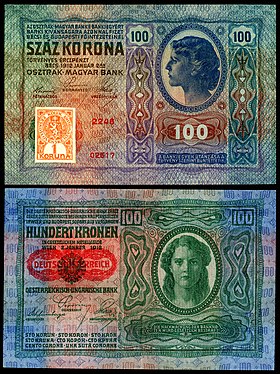
|
A 100-korun banknote from the first issue of the Czechoslovak koruna, the national currency of Czechoslovakia from 1919 to 1939 and from 1945 to 1993. The issue, which consisted of denominations of 10, 20, 50, 100 and 1000 korun, used banknotes of the Austro-Hungarian Bank to which adhesive stamps equal to 1/100 the value of the note were affixed. See another banknote: 10 korun, 20 korun, 50 korun, 1,000 korun Banknote: Austro-Hungarian Bank and the First Republic of Czechoslovakia; image courtesy of the National Numismatic Collection
Recently featured:
|
Subpage 5
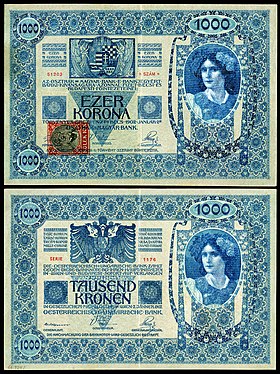
|
A 1,000-korun banknote from the first issue of the Czechoslovak koruna, the national currency of Czechoslovakia from 1919 to 1939 and from 1945 to 1993. The issue, which consisted of denominations of 10, 20, 50, 100 and 1000 korun, used banknotes of the Austro-Hungarian Bank to which adhesive stamps equal to 1/100 the value of the note were affixed. See another banknote: 10 korun, 20 korun, 50 korun, 100 korun Banknote: Austro-Hungarian Bank and the First Republic of Czechoslovakia; image courtesy of the National Numismatic Collection
Recently featured:
|
October 26

|
|
A diagram showing a timeline of the formation of the Universe from the Big Bang 13.799 ± 0.021 billion years ago through the "Dark Ages", formation of the earliest galaxies and stars, and the dark-energy dominated era. Size is depicted by the vertical extent of the grid in this graphic, while chronological time follows the horizontal axis. Diagram: NASA/WMAP Science Team; edit: Ryan Kaldari
Recently featured:
|
October 27

|
The Family Computer Disk System is a peripheral for Nintendo's Family Computer home video game console released in Japan in 1986. It allows users to play one of more than 200 games using proprietary floppy disks called "Disk Cards". Through the Disk System's entire production span, 1986–2003, 4.44 million units were sold. Photograph: Evan Amos |
October 28

|
A portrait of a king vulture (Sarcoramphus papa) at Walsrode Bird Park, Germany. This species of vulture lives predominantly in tropical lowland forests stretching from southern Mexico to northern Argentina. Though its ruff, flight, and tail feathers are gray to black, the king vulture's head and neck are bald and with varying skin color. Photograph: Olaf Oliviero Riemer |
October 29

|
Oedipus and the Sphinx is an 1864 oil-on-canvas painting by Gustave Moreau that depicts the meeting between Oedipus and the Sphinx on the road to Delphi. The painting was first exhibited at the French Salon of 1864, where it was an immediate success. It is now in the Metropolitan Museum of Art. Painting: Gustave Moreau
Recently featured:
|
October 30

|
"Precious Metal", a custom built, highly modified variant of the North American P-51 Mustang, racing in the Unlimited Gold Final Heat at the 2014 Reno Air Races. This aircraft runs a Rolls-Royce Griffon engine originally produced for the British Spitfire, and features coaxial contra-rotating propellers. Photograph: Don Ramey Logan
Recently featured:
|
October 31
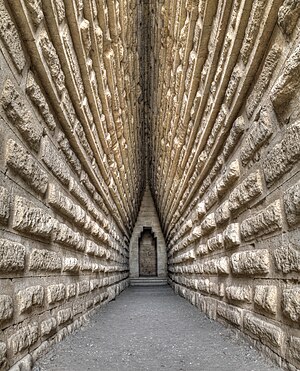
|
The Royal Kurgan is a 4th century BC kurgan (burial barrow) located near present-day Kerch, Crimea. The mound is almost 20 metres high and its base perimeter is about 250 metres. It holds a burial chamber with a square floor plan which gradually merges into the circular shape of a corbelled dome ("false vault"). It is assumed that the Royal Kurgan was the final resting place of a ruler of the Bosporan Kingdom. Photograph: Anatoly Shcherbak
Recently featured:
|
Picture of the day archives and future dates
